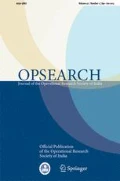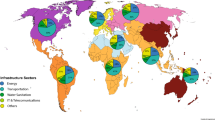Abstract
A smart city can be defined as an urban region with modern technological features, enhanced mobility and upgraded public utility services. Query In this paper, the application of an integrated approach is proposed to assess the relative performance of 98 Indian smart cities with respect to 11 evaluation criteria. Decision making trial and evaluation laboratory (DEMATEL) method is first adopted to divide all the considered criteria into appropriate cause and effect groups along with the determination of their weights. It also identifies the most influential criterion which dominates the others, and the most trivial criterion which is being dominated by the others. The application of the generalized k-means clustering algorithm reduces the initial dataset containing 98 smart cities into a manageable set with only 23 efficient cities. Finally, multi-attributive border approximation area comparison (MABAC) method is adopted to rank the shortlisted cities from the best to the worst. In the derived ranking list, Aizawl occupies the top position, followed by Mangalore. Warangal and Bilaspur are the two worst performing cities. The proposed approach can also recognize the relative strengths and weaknesses of each of the cities so that appropriate remedial measures can be augmented to strengthen the lagging infrastructures of the underperforming Indian smart cities.






Similar content being viewed by others
References
Akbar, P. A., Couture, V., Duranton, G., Ghani, E., Storeygard, A.: Mobility and congestion in urban India. Working Paper 25218, National Bureau of Economic Research (2018)
Albino, V., Berardi, U., Dangelico, R.M.: Smart cities: definitions, dimensions, performance, and initiatives. J. Urban Technol. 22, 3–21 (2015)
Al-Nasrawi, S., Adams, C., El-Zaart, A.: A conceptual multidimensional model for assessing smart sustainable cities. J. Inf. Syst. Technol. Manag. 12, 541–558 (2015)
Anand, A., Rufuss, D.D.W., Rajkumar, V., Suganthi, L.: Evaluation of sustainability indicators in smart cities for India using MCDM approach. Energy Procedia 141, 211–215 (2017)
Biswas, T.K., Das, M.C.: Selection of hybrid vehicle for green environment using multi-attributive border approximation area comparison method. Manag. Sci. Lett. 8, 121–130 (2018)
Caird, S.P., Hallett, S.H.: Towards evaluation design for smart city development. J. Urban Des. 24, 188–209 (2019)
Chakraborty, S., Dandge, S.S., Agarwal, S.: Non-traditional machining processes selection and evaluation: a rough multi-attributive border approximation area comparison approach. Comput. Ind. Eng. 139, 106201 (2020)
Chatterjee, K., Zavadskas, E.K., Tamošaitienė, J., Adhikary, K., Kar, S.: A hybrid MCDM technique for risk management in construction projects. Symmetry 10, 28 (2018). https://doi.org/10.3390/sym10020046
Chatterjee, P., Mondal, S., Boral, S., Banerjee, A., Chakraborty, S.: A novel hybrid method for non-traditional machining process selection using factor relationship and multi-attributive border approximation method. Facta Univ. Mech. Eng. 15, 439–456 (2017)
Deakin, M., Al Waer, H.: From intelligent to smart cities. Intell. Build. Int. 3, 140–152 (2011)
Debnath, A.K., Chin, H.C., Haque, M.M., Yuen, B.: A methodological framework for benchmarking smart transport cities. Cities 37, 47–56 (2014)
Debnath, A., Roy, J., Kar, S., Zavadskas, E.K., Antucheviciene, J.: A hybrid MCDM approach for strategic project portfolio selection of agro by-products. Sustainability 9, 33 (2017). https://doi.org/10.3390/su9081302
Eremia, M., Toma, L., Sanduleac, M.: The smart cities concept in the 21st century. Proc. Eng. 181, 12–19 (2017)
Fontela, E., Gabus, A.: The DEMATEL observer. DEMATEL 1976 report. Battelle Geneva Research Center, Geneva Switzerland (1976)
Gabus, A., Fontela, E.: Perceptions of the world problematique: communication procedure, communicating with those bearing collective responsibility. DEMATEL Report No. 1. Battelle Geneva Research Center, Geneva, Switzerland (1973)
Girardi, P., Temporelli, A.: Smartainability: a methodology for assessing the sustainability of the smart city. Energy Procedia 111, 810–816 (2017)
Halepoto, I. A., Sahito, A. A., Uqaili, M. A., Chowdhry, B. S., Riaz, T.: Multi-criteria assessment of smart city transformation based on SWOT analysis. In: Proceedings of 5th National Symposium on Information Technology, pp. 1–8 (2015)
Jawaid, M.F., Khan, S.A.: Evaluating the need for smart cities in India. Int. J. Adv. Res. Sci. Eng. 4, 991–996 (2015)
Kobryń, A.: DEMATEL as a weighting method in multi-criteria decision analysis. Mult. Criteria Decis. Mak. 12, 153–166 (2017)
Kourtit, K., Macharis, C., Nijkamp, P.: A multi-actor multi-criteria analysis of the performance of global cities. Tinbergen Institute Discussion Paper, 108, 1–42 (2013)
Mukul, E., Güler, M., Büyüközkan, G.: Evaluation of smart cities with integrated hesitant fuzzy linguistic AHP-COPRAS method. In: World Scientific Proceedings of Series on Computer Engineering and Information Science, Data Science and Knowledge Engineering for Sensing Decision Support, pp. 1184–1191 (2018)
Neirotti, P., De Marco, A., Cagliano, A.C., Mangano, G., Scorrano, F.: Current trends in smart city initiatives: some stylised facts. Cities 38, 25–36 (2014)
Pamučar, D., Ćirovic, G.: The selection of transport and handling resources in logistics centers using multi-attributive border approximation area comparison (MABAC). Expert Syst. Appl. 42, 3016–3028 (2015)
Rana, N.P., Luthra, S., Mangla, S.K., Islam, R., Roderick, S., Dwivedi, Y.K.: Barriers to the development of smart cities in Indian context. Inf. Syst. Front. 21, 503–525 (2019)
Randhawa, A., Kumar, A.: Exploring sustainability of smart development initiatives in India. Int. J. Sustain. Built Environ. 6, 701–710 (2017)
Ranjan, R., Chatterjee, P., Panchal, D., Pamučar, D.: Performance evaluation of sustainable smart cities in India: an adaptation of cartography in PROMETHEE-GIS approach. In: P. Chatterjee, M. Yazdani, S. Chakraborty, D. Panchal and S. Bhattacharyya, (Eds.) Advanced Multi-criteria Decision Making for Addressing Complex Sustainability Issues, pp. 14–40 (2019)
Roy, J., Chatterjee, K., Bandyopadhyay, A., Kar, S.: Evaluation and selection of medical tourism sites: A rough analytic hierarchy process based multi-attributive border approximation area comparison approach. Expert Syst. 35, 19 (2018). https://doi.org/10.1111/exsy.12232(2018)
Stanković, J., Džunić, M., Džunić, Ž, Marinković, S.: A multi-criteria evaluation of the European cities’ smart performance: economic, social and environmental aspects. Proc. Rijeka School Econ. 35, 519–550 (2017)
Tiwari, A., Mishra, N.: Sustainable and smart city project: an overview of the application of multiple criteria decision making techniques and approaches for Indian context. Int. J. Manag. Appl. Sci. 3, 1–6 (2017)
Yang, M., Zhang, Y.: Analysis of analytic hierarchy process to build a cities evaluation system based on smart growth. Curr. Urban Stud. 5, 483–489 (2017)
Author information
Authors and Affiliations
Corresponding author
Additional information
Publisher's Note
Springer Nature remains neutral with regard to jurisdictional claims in published maps and institutional affiliations.
Rights and permissions
About this article
Cite this article
Chakraborty, S., Ghosh, S., Agarwal, S. et al. An integrated performance evaluation approach for the Indian smart cities. OPSEARCH 58, 906–941 (2021). https://doi.org/10.1007/s12597-021-00527-3
Accepted:
Published:
Issue Date:
DOI: https://doi.org/10.1007/s12597-021-00527-3




